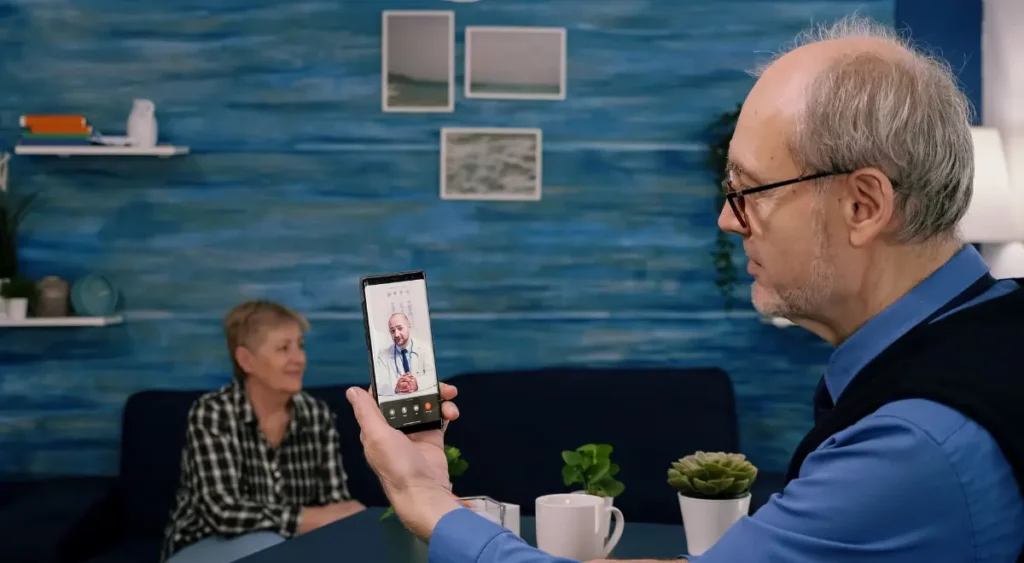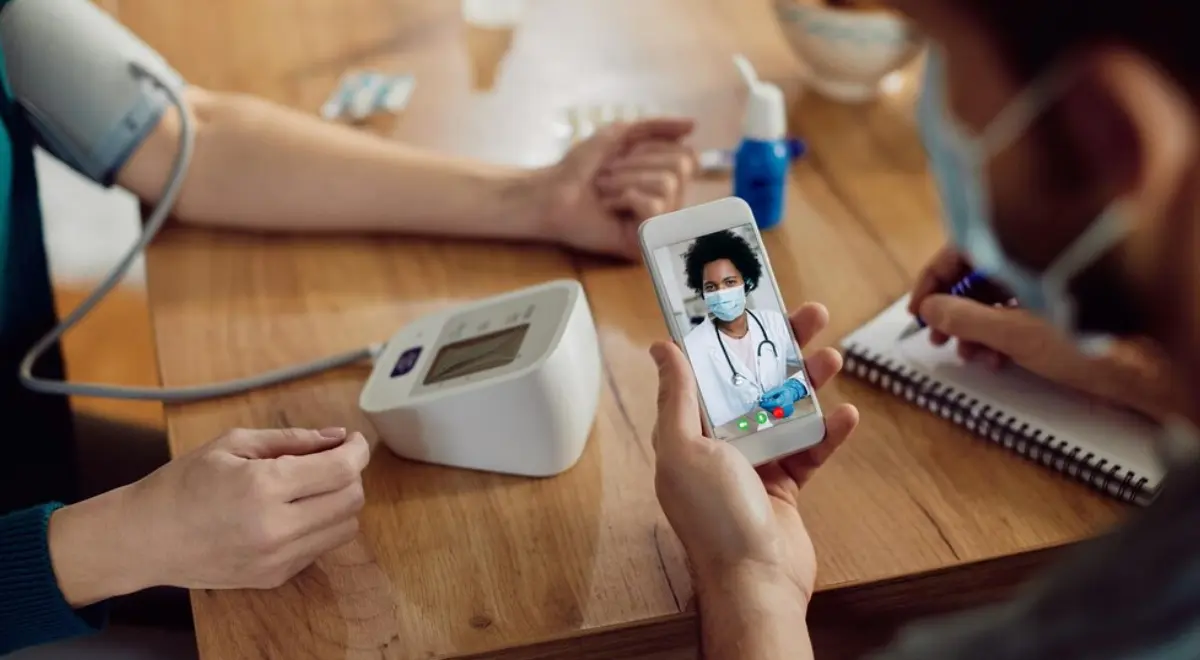How Remote Patient Monitoring Supports Elderly Care in Cold Weather

Winter is here! With the drop in temperature, maintaining the health and well-being of the elderly population becomes a pressing concern. Cold weather brings seasonal illnesses and flu, putting the elderly, especially those with chronic diseases like heart and respiratory conditions, at greater risk of falling ill.
Additionally, cold weather makes it difficult for older adults to attend doctor appointments, increasing their risk of seasonal infections. Remote Patient Monitoring (RPM) plays a significant role in reducing health risks and supporting elderly care in cold weather. It helps healthcare providers to collect and analyze vitals of their patients outside of the traditional clinical settings via cellular medical devices that help track and report the crucial health parameters in real time.
Table of Contents
ToggleBenefits of RPM in Supporting Elderly Care
From real-time monitoring to improving health outcomes and patient engagement, remote patient monitoring for elderly care in winter helps avoid potential health issues and infections. Some of its other benefits include:
- Continuous Monitoring: RPM allows healthcare providers to assess their patients’ vital signs, such as heart rate, blood pressure, and oxygen levels, anytime and from anywhere. This 24/7 monitoring makes it an effective platform in detecting potential health issues before they deteriorate and help maintain good health in old aged patients.
- Timely Interventions: A significant benefit of RPM is its ability to transmit real-time data, enabling healthcare providers to quickly respond to irregular readings and facilitate timely interventions. This helps prevent sudden emergencies and hospitalizations in the older population.
- Improved Communication: RPM minimizes the communication gap between healthcare providers and patients. With real time monitoring, notification alerts and regular updates, remote patient monitoring helps in making more informed decisions and alter care plans whenever needed.
How Remote Patient Monitoring Helps Prevent Seasonal Illnesses in Old Aged?
With the change in season, the older population is at a greater risk of getting infected with seasonal illnesses, especially due to compromised immune systems. To avoid getting out in cold weather and prevent seasonal illness, RPM focuses on:
- Monitoring Respiratory Health: Patients with respiratory conditions, such as asthma and Chronic Obstructive Pulmonary Disease (COPD), are more prone to flu and influenza. By monitoring oxygen levels regularly, RPM can help avoid and manage respiratory issues in older adults. Few RPM devices used in monitoring respiratory health include:
- Spirometers: They help measure how well the lungs are functioning and any abnormal readings can help detect early signs of respiratory infections or compromised lungs functioning.
- Oximeters: Oximeters are monitoring devices that can track the oxygen levels in the body and can alert healthcare providers if oxygen saturation falls below the normal levels.
- Tracking Body Temperature: Seasonal flu and other viral infections often cause fever and a rise in body temperature that can be particularly dangerous for elderly patients. Using RPM devices such as thermometers, providers can help monitor body temperature and receive alerts in case there is a sudden rise in temperature, thereby ensuring prompt medical attention.
- Boosting Medication Adherence: With the onset of cold weather and the rise in flu and viral infection, there’s an increased need for medication management that remote patient monitoring can greatly help with. RPM ensures medication adherence by helping adjust medications based on real-time patient reports and virtual consultations. It also helps in setting up medication reminders and notifying both patients and healthcare providers in case the medications are missed, thereby reducing medical complications due to improper medication adherence.
- Managing Chronic Conditions: Cold weather can worsen chronic conditions in the elderly population, especially heart diseases and respiratory illnesses. RPM supports care coordination and management by monitoring heart rate and fluid retention, using:
- Heart Rate Monitors: These devices monitor the heart rate and rhythm to detect abnormal readings, thereby preventing serious heart complications.
- Weighing Scales: Fluid retention in chronically ill patients often leads to significant weight gain. By monitoring weight and fluid intake regularly, RPM can alert healthcare providers about weight changes and fluid retention, thereby allowing timely intervention.
Role of Remote Care Technology in Supporting Elderly Care
With healthcare technology continuing to evolve, RPM and telehealth systems are expanding their capabilities to provide even better support and care to elderly patients during the cold weather. AI-driven RPM systems can predict the underlying health risks by comparing the patient data and identifying trends to prevent health complications in the future.
Many elderly patients may not be tech-savvy, so RPM software providers like HealthArc offer user-friendly devices and interfaces to ensure that older adults can fully utilize remote patient monitoring systems.
Moreover, RPM can seamlessly integrate with Electronic Health Records (EHR), allowing healthcare providers to coordinate with other healthcare providers and have a comprehensive view of a patient’s health history, thereby allowing informed decision making.
Conclusion
Cold weather can lead to severe health complications in the elderly, and RPM can help prevent these challenges by providing essential support, continuous monitoring, timely interventions, and improved communication. By making the right use of RPM, families and caregivers can reduce the risks associated with seasonal illnesses and improve the quality of life for their elderly loved ones.
HealthArc is an advanced care management platform that helps healthcare providers connect to their elderly patients and offers seamless integration with all leading EHRs through HL7 and FHIR capabilities.
Schedule a free demo today or call us at (201) 885 5571 to find out how our digital health platform can help you boost health outcomes in the elderly population.
Most recent blogs
Categories
- Advanced Primary Care Management
- Behavioral Health Integration
- Cellular Remote Patient Monitoring
- Chronic Care Management
- Chronic Care Management Billing
- Chronic Care Management CPT Codes
- Chronic Care Management Program
- Chronic Care Management Software
- Digital Health Platform
- Principal Care Management
- Principal Care Management CPT Codes
- Remote Care Programs
- Remote Monitoring Devices
- Remote Patient Care
- Remote Patient Monitoring
- Remote Patient Monitoring Billing
- Remote Patient Monitoring CPT Codes
- Remote Patient Monitoring Devices
- Remote Patient Software
- Remote Therapeutic Monitoring
- Remote Therapeutic Monitoring Billing
- Remote Therapeutic Monitoring CPT Codes
- Telemedicine & RPM
- Transitional Care Management
- Transitional Care Management Billing
- Transitional Care Management CPT Codes
Related Posts
- February 21, 2025 | Read Time: 5 mins
RPM’s Role in Identifying Early Symptoms of Chronic Conditions for Prevention
- February 14, 2025 | Read Time: 4 mins
Monitoring Post-Surgical Recovery With RPM Systems
- February 10, 2025 | Read Time: 5 mins






